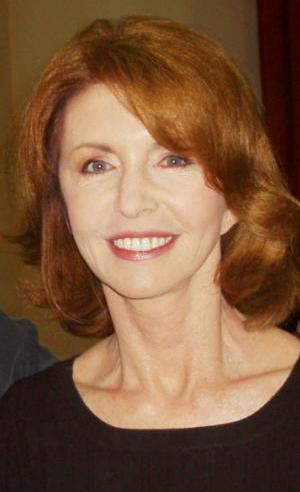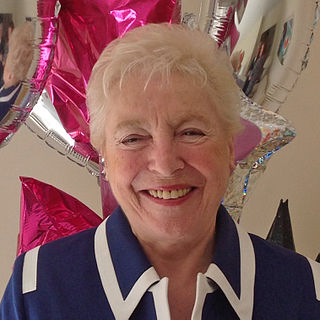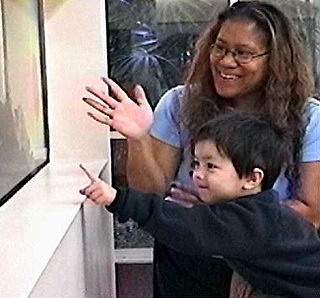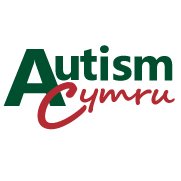
Asperger syndrome (AS), also known as Asperger's syndrome, formerly described a neurodevelopmental disorder characterized by significant difficulties in social interaction and nonverbal communication, along with restricted and repetitive patterns of behavior, interests, and activities. The syndrome has been merged with other disorders into autism spectrum disorder (ASD) and is no longer considered a stand-alone diagnosis. It was considered milder than other diagnoses that were merged into ASD due to relatively unimpaired spoken language and intelligence.

Jane Asher is an English actress and author. She achieved early fame as a child actress, and then through her association with Paul McCartney, and has worked extensively in film and TV throughout her career.

Neurodiversity is a framework for understanding human brain function and mental illness. It argues that diversity in human cognition is normal and that some conditions classified as mental disorders are differences and disabilities that are not necessarily pathological.
Ole Ivar Løvaas was a Norwegian-American clinical psychologist and professor at the University of California, Los Angeles. He is most well known for his research on what is now called applied behavior analysis (ABA) to teach autistic children through prompts, modeling, and positive reinforcement. The therapy is also noted for its use of aversives (punishment) to reduce undesired behavior, however these are now used less commonly than in the past.
Parkinson's UK is a Parkinson's research and support charity in the United Kingdom. In April 2010, the Parkinson's Disease Society changed its name to become Parkinson's UK. Its aims are to improve the quality of life for people affected by Parkinson's and find a cure for the condition.
High-functioning autism (HFA) was historically an autism classification where a person exhibits no intellectual disability, but may experience difficulty in communication, emotion recognition, expression, and social interaction.
The following outline is provided as an overview of and topical guide to autism:
Developmental disability is a diverse group of chronic conditions, comprising mental or physical impairments that arise before adulthood. Developmental disabilities cause individuals living with them many difficulties in certain areas of life, especially in "language, mobility, learning, self-help, and independent living". Developmental disabilities can be detected early on and persist throughout an individual's lifespan. Developmental disability that affects all areas of a child's development is sometimes referred to as global developmental delay.

Dame Vera Stephanie "Steve" Shirley is an information technology pioneer, businesswoman and philanthropist.
The Shirley Foundation, based in the United Kingdom, was established in 1996 by Dame Stephanie Shirley CH, who gave a substantial endowment to establish a charitable trust fund. The foundation ranked in the top 50 of grant giving foundations in the UK and was 'spent out' in 2018.

Autism therapies include a wide variety of therapies that help people with autism, or their families. Such methods of therapy seek to aid autistic people in dealing with difficulties and increase their functional independence.
In human development, muteness or mutism is defined as an absence of speech, with or without an ability to hear the speech of others. Mutism is typically understood as a person's inability to speak, and commonly observed by their family members, caregivers, teachers, doctors or speech and language pathologists. It may not be a permanent condition, as muteness can be caused or manifest due to several different phenomena, such as physiological injury, illness, medical side effects, psychological trauma, developmental disorders, or neurological disorders. A specific physical disability or communication disorder can be more easily diagnosed. Loss of previously normal speech (aphasia) can be due to accidents, disease, or surgical complication; it is rarely for psychological reasons.

Societal and cultural aspects of autism or sociology of autism come into play with recognition of autism, approaches to its support services and therapies, and how autism affects the definition of personhood. The autistic community is divided primarily into two camps; the autism rights movement and the Pathology paradigm. The pathology paradigm advocates for supporting research into therapies, treatments, and/or a cure to help minimize or remove autistic traits, seeing treatment as vital to help individuals with autism, while the neurodiversity movement believes autism should be seen as a different way of being and advocates against a cure and interventions that focus on normalization, seeing it as trying to exterminate autistic people and their individuality. Both are controversial in autism communities and advocacy which has led to significant infighting between these two camps. While the dominant paradigm is the pathology paradigm and is followed largely by autism research and scientific communities, the neurodiversity movement is highly popular among most autistic people, within autism advocacy, autism rights organizations, and related neurodiversity approaches have been rapidly growing and applied in the autism research field in the last few years.

Classic autism, also known as childhood autism, autistic disorder, (early) infantile autism, infantile psychosis, Kanner's autism,Kanner's syndrome, or (formerly) just autism, is a neurodevelopmental condition first described by Leo Kanner in 1943. It is characterized by atypical and impaired development in social interaction and communication as well as restricted, repetitive behaviors, activities, and interests. These symptoms first appear in early childhood and persist throughout life.

Autism Speaks Inc. is a non-profit autism awareness organization and the largest autism research organization in the United States. It sponsors autism research and conducts awareness and outreach activities aimed at families, governments, and the public. It was founded in February 2005 by Bob Wright and his wife Suzanne, a year after their grandson Christian was diagnosed with autism. The same year as its founding, the organization merged with Autism Coalition for Research and Education. It then merged with the National Alliance for Autism Research in 2006 and Cure Autism Now in 2007.

Autism, formally called autism spectrum disorder (ASD) or autism spectrum condition (ASC), is a neurodevelopmental disorder marked by deficits in reciprocal social communication and the presence of restricted and repetitive patterns of behavior. Other common signs include difficulties with social interaction, verbal and nonverbal communication, along with perseverative interests, stereotypic body movements, rigid routines, and hyper- or hyporeactivity to sensory input. Autism is clinically regarded as a spectrum disorder, meaning that it can manifest very differently in each person. For example, some are nonspeaking, while others have proficient spoken language. Because of this, there is wide variation in the support needs of people across the autism spectrum.

Autism Cymru was Wales' national charity for autism with offices in Cardiff, Wrexham, and Aberystwyth. The charity was established in May 2001 through an initial 3-year grant provided by The Shirley Foundation. The founder chair of the Trustees was Dame Stephanie Shirley of the Shirley Foundation.
Diagnosis, treatment, and experiences of autism varies globally. Although the diagnosis of autism is rising in post-industrial nations, diagnosis rates are much lower in developing nations.
The history of autism spans over a century; autism has been subject to varying treatments, being pathologized or being viewed as a beneficial part of human neurodiversity. The understanding of autism has been shaped by cultural, scientific, and societal factors, and its perception and treatment change over time as scientific understanding of autism develops.
The Interagency Autism Coordinating Committee (IACC) is a United States federal advisory panel within the Department of Health and Human Services (HHS). It coordinates all efforts within HHS concerning autism spectrum disorder (ASD).









